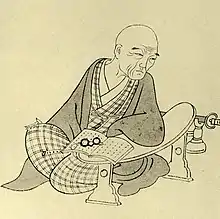Yokoi Yayū (横井 也有) | |
|---|---|
 Yokoi Yayū | |
| Born | Yokoi Tokitsura (横井 時般) October 24, 1702 Nagoya |
| Died | July 15, 1783 (aged 80) |
| Pen name | Tatsunojō |
| Occupation | Poet |
| Nationality | Japanese |
| Notable works | Uzuragoromo 鶉衣(The Quail's Cloak) |
Yokoi Yayū (横井 也有, October 24, 1702 – July 15, 1783) was a Japanese samurai best known for his haibun, a scholar of Kokugaku, and haikai poet. He was born Yokoi Tokitsura (横井 時般), and took the pseudonym Tatsunojō. His family are believed to be descendants of Hōjō Tokiyuki.
Life
Yayū was born in Nagoya, the first son of Yokoi Tokihira (時衡) who served the Owari Domain. He inherited the Yokoi House's patrimony at twenty-six and held important posts of the Owari Domain. He was for example yōnin (manager of general affairs), Ōbangashira (chief of guard) and Jisha-Bugyō (manager of religious affairs). In 1754, at age 53, he retired for health reasons. Yayū moved to Maezu (前津) (now in Naka-ku, Nagoya), and lived in the Chiutei (知雨亭) hermitage. He was a prolific and respected composer of haibun, Classical Chinese poems, waka and Japanese satirical poems, and was an adept of the Japanese tea ceremony.
Works
Yayū also excelled in Japanese martial arts, studied Confucianism and learned haikai from Mutō Hajaku (武藤巴雀) and Ōta Hajō (太田巴静). Hajaku and Hajō were pupils of Kagami Shikō (各務支考), a leading disciple of Matsuo Bashō. Mori Senzō (森銑三), a student of old Japanese literature, compared his hokku to senryū, and said they were not as interesting as his haibun. Yayū has been described as a master of haibun, and Nagai Kafū 永井荷風 called Yayū's haibun a model of Japanese prose.

- "Uzuragoromo" (鶉衣) : An anthology of haibun, partially translated in Monumenta Nipponica, vol. 34, no. 3, Autumn 1979, by Lawrence Rogers.
- "Rayō Shū", "Tetsu Shū" (蘿葉集), (垤集): Anthology of haiku.
- "More Oke" (漏桶): Anthology of renku
- "Kankensō" (管見草): Essay on haikai
- "Rain Hen" (蘿隠編): Prose and poetry in Classical Chinese
- "Gyō-Gyō-Shi" (行々子): An anthology of Japanese satirical poems
See also
References
- "Zoku Kinsei Kijinden" (続近世畸人伝) by Ban Kōkei (伴蒿蹊) (in Japanese)
- "Haika Kijin-Dan" (俳家奇人談) by Takenouchi Gengen-ichi (竹内玄玄一) (in Japanese)